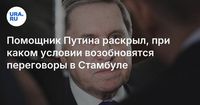On May 11, 2025, Russian President Vladimir Putin announced his intention to engage in direct negotiations with Ukraine, proposing to resume talks in Istanbul on May 15, 2025. This development comes as Turkey has expressed its readiness to facilitate these discussions, having previously offered its services as a mediator.
In a statement, Putin emphasized the importance of addressing the underlying causes of the ongoing conflict between Russia and Ukraine, asserting that the goal is to reach a long-term and durable peace agreement. He stated, "We propose to resume direct negotiations with the Kyiv regime on Thursday, May 15, 2025, in Istanbul, where they were interrupted," highlighting the urgency of the situation.
Putin's proposal includes the possibility of discussing new ceasefires during the negotiations, although he has expressed skepticism about ceasefires that merely prolong hostilities. He stated, "We are against ceasefires that lead to the continuation of hostilities with a re-equipped and replenished Ukrainian army." This indicates a strategic approach to the negotiations, aiming for a resolution that prevents further escalation of violence.
According to a diplomatic source in Turkey, the nation is awaiting concrete actions following Putin's proposal. The source noted, "From our side, we have repeatedly expressed readiness to provide any mediating efforts for conducting negotiations. We need to wait for concrete actions." This reflects Turkey's position as a potential facilitator of dialogue between the two nations.
Putin's announcement follows a period of stalled negotiations, which were interrupted in 2022. The Russian leader's call for direct talks without preconditions marks a significant shift in the diplomatic landscape. He has made it clear that the final decision on resuming negotiations will depend on the response from Kyiv.
In addition to proposing negotiations, Putin plans to discuss the matter with Turkish President Recep Tayyip Erdogan. The Kremlin has stated that the head of the Russian delegation for the talks will be announced shortly, with aides confirming that the delegation's composition, whether it will include diplomats or military personnel, is still to be determined.
Yuri Ushakov, an aide to the Russian president, stated, "We are ready from early morning," indicating Russia's preparedness to engage in discussions as soon as the negotiations commence. This readiness underscores the urgency that both sides feel in addressing the conflict, which has resulted in significant loss of life and destabilization in the region.
As the situation develops, the international community will be closely watching the outcome of the proposed talks in Istanbul. The potential for renewed dialogue raises hopes for a resolution to a conflict that has persisted for several years, with both sides having suffered extensive casualties and economic repercussions.
Putin's recent declaration also comes amidst ongoing discussions regarding a potential 30-day ceasefire, a proposal put forth by Ukraine, Europe, and the United States. However, during his address, Putin did not mention this ceasefire, indicating that his focus remains on direct negotiations rather than temporary truces.
The geopolitical implications of the upcoming negotiations are significant, as Turkey's role as a mediator could influence not only the dynamics between Russia and Ukraine but also broader regional stability. Turkey has positioned itself as a neutral party capable of engaging with both sides, which could enhance its standing in international diplomacy.
In summary, the upcoming negotiations in Istanbul represent a critical juncture in the ongoing conflict between Russia and Ukraine. With both sides expressing a willingness to engage, the hope is that these talks will pave the way for a lasting peace agreement that addresses the root causes of the conflict. As the world watches closely, the outcome of these discussions could have far-reaching consequences for the region and beyond.


